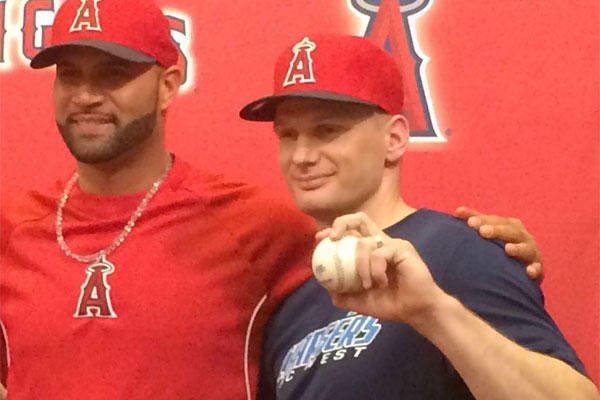WASHINGTON – Even before he took his seat at Nationals Park here April 22, Air Force Staff Sgt. Thomas Sherrill said, he fantasized about what he would do if he somehow caught the milestone home run ball off the bat of slugger Albert Pujols.
The Los Angeles Angels of Anaheim first baseman began the game against the Washington Nationals two home runs shy of 500 in his Major League Baseball career. He struck for home run 499 in the top of the first inning. Anticipating Pujols’ next time at bat and seated in foul territory, Sherrill said, he and a friend spotted an opportunity to sit on the fair side of the foul pole, creating an outside chance of being in the area where the potential home run might land.
With Pujols down in the count with one ball and two strikes, Sherrill said, he started to feel that it just wasn’t in the cards that night. The next pitch was a sinker that Pujols took deep to left-center field.
“I could tell where it was going,” Sherrill said. “It was well above me, so I just jumped out of my chair and started running up the stairs.”
Sherrill said he looked up to see another man running down the steps – the race was on.
“I knew it was going to him. … I gave up on the ball at that point,” he said. “But it bounced off him, and I was able to grab it off the hop.”
He said he looked down at the ball in his hands, and all at once he realized he had just caught Pujols’ 500th home run. At this point, the decision literally was in his hands: Give the ball back to Pujols, or keep the high-value souvenir for himself.
“Even before that day, … I had already decided if I somehow caught it, I would give it back,” Sherrill said. “It just seemed like the right thing to do. When I actually had the ball in my hand, nothing changed. I still felt the same way.
“It’s his milestone. It’s his ball,” he continued. “Who am I to try to sell it back to him?”
As Chris Gordon, the man who missed his chance at catching the home run, shook Sherrill’s hand and congratulated him, Sherrill said, he felt compelled to offer a consolation prize, and arranged for Gordon and his children to accompany him to meet Pujols.
“I felt really bad for him,” he said. “This is a once-in-a-lifetime opportunity, and it just slipped through his fingers.”
As security escorted him through the stadium and beyond the restricted areas, Sherrill said, fans made it known what they thought he should do with the baseball.
“People were screaming at me as I was walking away, telling me to sell it [and] how much [Pujols] makes a year. … People made sure I knew that it was valuable,” he said.
But through it all, he said, the decision he made while entertaining his fantasy of catching the ball was never in jeopardy. Minutes after catching the ball and already under scrutiny, his integrity was unwavering.
The entire experience was unforgettable, he said, adding that he feels a sense of satisfaction in giving the ball back to its rightful owner. Pujols himself has said Sherrill was “very honest to give it back,” and that he appreciates it.





























